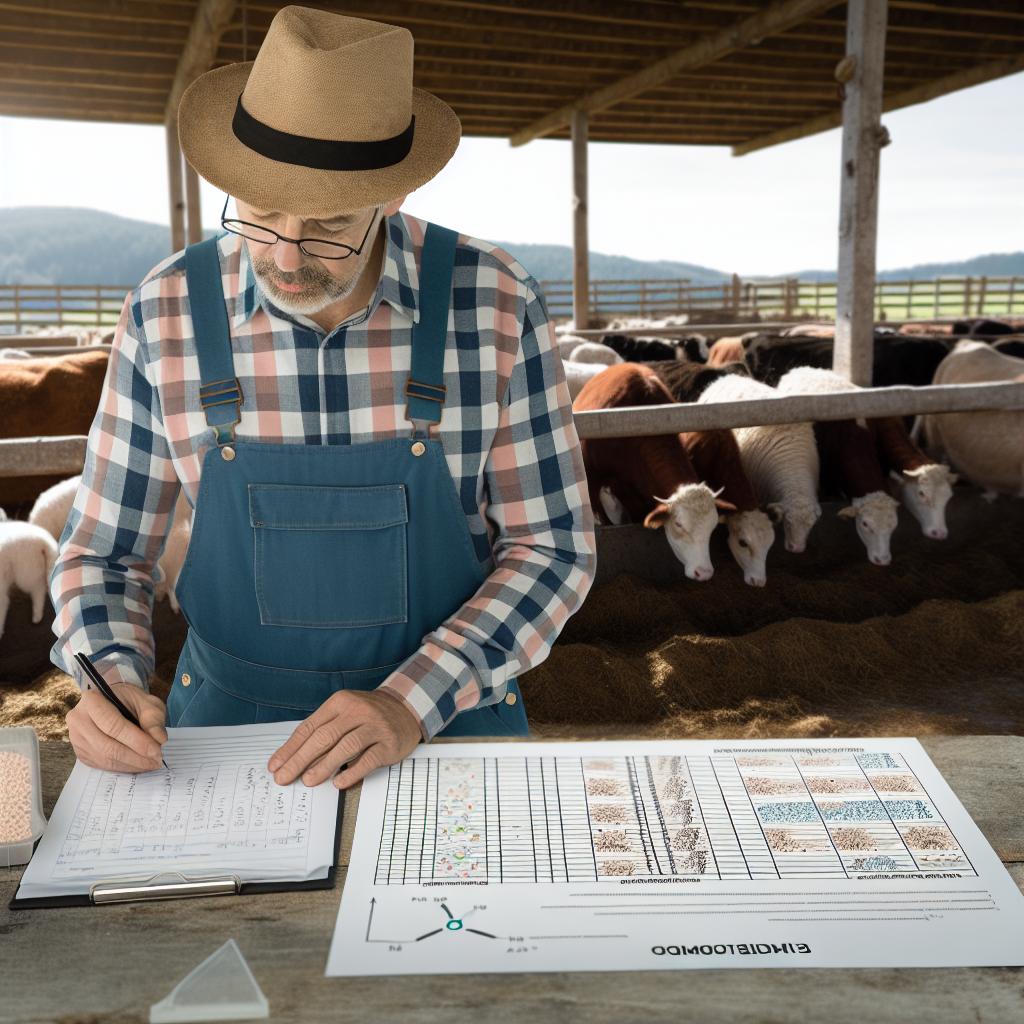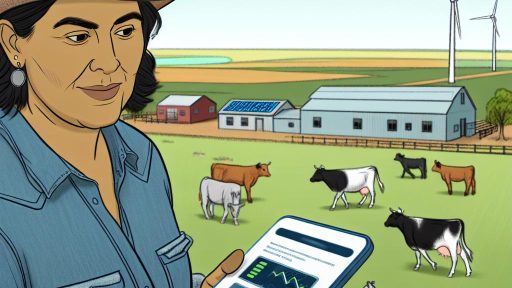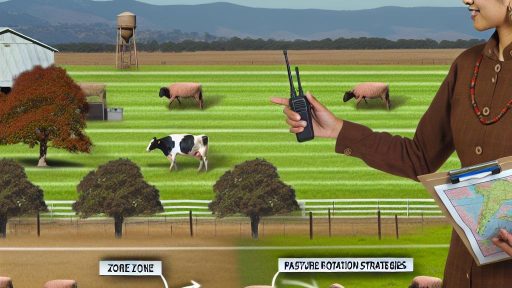Introduction to Sustainable Livestock Practices and Their Importance
Sustainable livestock practices play a vital role in modern agriculture.
They help reduce the reliance on antibiotics and improve animal health.
By implementing these practices, farmers can ensure a healthier ecosystem.
This approach supports animal welfare and enhances food quality.
Moreover, it addresses the growing concerns regarding antibiotic resistance.
As a result, consumers can enjoy safer food products.
Additionally, sustainable livestock practices promote biodiversity.
They create a balanced environment for both animals and surrounding wildlife.
Effective management of livestock also improves soil health.
This leads to increased productivity over time for farmers.
Furthermore, sustainable practices can lower production costs for farmers.
With reduced antibiotic use, farmers can decrease medical expenses.
Thus, adopting these methods is a win-win for both the economy and the environment.
Transitioning towards sustainable methods requires commitment and knowledge.
Farmers need access to resources and training to adopt these practices.
Transform Your Agribusiness
Unlock your farm's potential with expert advice tailored to your needs. Get actionable steps that drive real results.
Get StartedCollaborative efforts among stakeholders are essential for success.
Everyone from producers to consumers plays a role in driving this change.
Sustainable livestock practices are essential for a resilient agricultural future.
Understanding the Role of Antibiotics in Livestock Production
Importance of Antibiotics
Antibiotics play a crucial role in livestock production.
They help prevent diseases in animals raised for food.
Moreover, antibiotics promote growth and improve feed efficiency.
However, their overuse can lead to significant problems.
Risks of Antibiotic Overuse
Overusing antibiotics in livestock can create resistant bacteria.
These resistant strains can impact both animal and human health.
Infections that were once easily treatable become more challenging.
Consequently, this creates a public health crisis globally.
Regulations and Stewardship
Governments worldwide are implementing stricter regulations on antibiotic use.
These regulations aim to ensure responsible antibiotic stewardship.
Farmers are encouraged to adopt practices that minimize antibiotic use.
Education on effective alternatives is vital for this transition.
Alternatives to Antibiotics
Several alternatives can reduce the reliance on antibiotics.
Improving livestock nutrition is one effective strategy.
Additionally, enhancing animal welfare can decrease disease occurrence.
Vaccination programs also play a significant role in disease prevention.
Future Directions for Antibiotic Use in Livestock
Future livestock practices must focus on sustainability and health.
Through responsible management, the need for antibiotics can decline.
Ultimately, healthier livestock will lead to safer food production.
The Adverse Effects of Antibiotic Overuse on Animal Health and Human Safety
Impact on Animal Health
Antibiotic overuse leads to antibiotic resistance in livestock.
This resistance can make treating common infections extremely difficult.
Showcase Your Farming Business
Publish your professional farming services profile on our blog for a one-time fee of $200 and reach a dedicated audience of farmers and agribusiness owners.
Publish Your ProfileConsequently, sick animals may experience prolonged suffering.
Additionally, the effectiveness of antibiotics diminishes over time.
Farmers face increased economic losses due to treatment failures.
Consequences for Human Health
Human health risks rise when antibiotic-resistant bacteria spread.
People may suffer from infections that are hard to treat.
Furthermore, contaminated food products can pose significant dangers.
The emergence of multidrug-resistant pathogens becomes a serious concern.
Hospitalizations due to antibiotic-resistant infections increase each year.
Environmental Impact
A antibiotic residues often enter the soil and water supply.
This contamination disrupts local ecosystems significantly.
Consequently, the biodiversity of various habitats is at risk.
Moreover, the spread of resistance genes among wild species is alarming.
Protecting environmental health is essential for sustainable farming.
Regulatory and Economic Considerations
Governments are implementing stricter regulations on antibiotic use.
Farmers must adjust their practices to comply with these rules.
Economically, reducing antibiotic use can be beneficial long-term.
Healthier livestock can lead to reduced veterinary costs.
Ultimately, embracing sustainable practices can improve farm profitability.
Uncover the Details: How Proper Foot Care Can Prevent Lameness in Farm Animals
Principles of Sustainable Livestock Farming
Enhancing Animal Welfare
Sustainable livestock farming prioritizes animal welfare.
Healthy animals produce better quality meat and milk.
Good welfare practices reduce stress and disease.
Farmers use appropriate housing and nutrition to promote well-being.
Promoting Genetic Diversity
Genetic diversity is crucial for resilient livestock populations.
It enhances adaptability to changing environments and diseases.
Breeding programs should focus on preserving local breeds.
A diverse gene pool improves overall herd health.
Implementing Sustainable Feeding Practices
Feeding practices directly impact livestock health and antibiotic use.
Farmers should prioritize high-quality, nutritious feed.
Utilizing locally available feeds reduces transportation emissions.
Moreover, integrating crops and livestock enhances nutrient cycling.
Utilizing Integrated Pest Management
Integrated pest management minimizes reliance on antibiotics.
This approach uses biological and cultural methods for pest control.
Farmers should regularly monitor livestock for signs of disease.
Timely interventions can prevent disease outbreaks.
Adopting Rotational Grazing Techniques
Rotational grazing improves pasture health and productivity.
This technique prevents overgrazing and promotes soil health.
Healthy pastures support diverse ecosystems and reduce disease risk.
Furthermore, it enhances livestock nutrition through diverse forages.
Reducing Environmental Impact
Sustainable practices aim to lower greenhouse gas emissions.
Showcase Your Farming Business
Publish your professional farming services profile on our blog for a one-time fee of $200 and reach a dedicated audience of farmers and agribusiness owners.
Publish Your ProfileFarmers can minimize waste through efficient manure management.
Implementing cover crops improves soil health and captures carbon.
Ultimately, these practices contribute to a healthier planet.
Delve into the Subject: Choosing Heritage Chicken Breeds For More Robust Poultry Farm Operations
Implementing Rotational Grazing Techniques to Enhance Animal Health
Benefits of Rotational Grazing
Rotational grazing improves pasture quality and increases forage productivity.
It allows pastures to recover, promoting healthier grasslands.
Animals enjoy a diet rich in diverse nutrients, enhancing their overall health.
Moreover, this method reduces soil erosion by protecting the topsoil.
Improving Animal Welfare
Rotational grazing encourages natural behaviors in livestock.
Animals have access to fresh pastures, which improves their mental well-being.
Healthier livestock experiences fewer diseases and less stress overall.
In turn, this reduces the need for antibiotics in livestock management.
Environmental Impact
This grazing method positively influences soil health and biodiversity.
It enhances water retention and reduces runoff in pastureland.
Additionally, rotational grazing contributes to carbon sequestration in the soil.
Thus, it plays an essential role in mitigating climate change effects.
Implementing Rotational Grazing
Start by dividing grazing areas into smaller paddocks.
Rotate livestock through these paddocks systematically.
Monitor pasture condition to determine grazing duration effectively.
Implementing this strategy requires planning and commitment.
However, the long-term benefits greatly outweigh the initial effort.
Challenges and Solutions
Some farmers face challenges in adopting rotational grazing techniques.
Access to water can be a significant hurdle.
Installing portable watering systems can resolve this issue.
Additionally, educating farmers about the benefits enhances adoption rates.
Workshops and local farmer groups can facilitate this education effectively.
Case Studies
Farmers like Maria Gonzales in Texas have successfully implemented rotational grazing.
Her farms report improved cattle health and reduced costs for veterinary care.
Similarly, James Peterson in Wisconsin has noticed better pasture recovery.
These successes highlight the effectiveness of rotational grazing techniques.
Delve into the Subject: Poultry Management for Controlling Parasites
Integrating Alternative Therapies
Probiotics and Prebiotics in Livestock
Probiotics play a crucial role in livestock health.
These beneficial bacteria help balance the gut microbiome.
In addition, they enhance nutrient absorption effectively.
Research shows that probiotics reduce the need for antibiotics.
This strategy minimizes antibiotic resistance in livestock.
Prebiotics also support livestock health significantly.
They serve as food for beneficial gut bacteria.
Moreover, prebiotics stimulate immune responses in animals.
Benefits of Probiotics
Probiotics offer various health advantages to livestock.
Showcase Your Farming Business
Publish your professional farming services profile on our blog for a one-time fee of $200 and reach a dedicated audience of farmers and agribusiness owners.
Publish Your ProfileThey improve digestion and reduce gastrointestinal disorders.
Additionally, probiotics enhance overall animal weight gain.
- Improved feed efficiency boosts production rates.
- Reduced incidents of diarrhea enhance animal welfare.
- Greater resilience against disease lowers healthcare costs.
Benefits of Prebiotics
Prebiotics contribute positively to livestock health.
They promote a healthy gut environment.
This results in enhanced nutrient utilization within the body.
- Prebiotics can increase milk production in dairy animals.
- They help decrease the duration of digestive issues.
- Additionally, they play a role in stress management.
Practical Implementation of Alternative Therapies
Farmers can incorporate probiotics and prebiotics into feed.
Choosing quality products is essential for effectiveness.
Consulting with a veterinarian can provide tailored solutions.
Monitoring animal health regularly ensures optimal results.
Adjustments to feed composition may be necessary based on performance.
This approach promotes animal health while reducing reliance on antibiotics.
Learn More: Innovative Queen Bee Breeding Methods For Robust Colonies In U.S. Agriculture

Nutritional Strategies for Improving Livestock Immunity and Reducing Dependency on Antibiotics
Enhancing Feed Quality
Improving feed quality plays a crucial role in livestock health.
Nutrient-rich diets can bolster the immune systems of animals.
High-quality forage and grains can enhance overall performance.
Moreover, using organic feed can reduce the need for antibiotics.
Incorporating Probiotics
Probiotics can improve gut health and boost immunity in livestock.
These beneficial microbes compete with pathogens for resources.
Additionally, they can help stabilize gut microbiota.
Healthy gut flora promotes better nutrient absorption.
Utilizing Natural Supplements
Natural supplements such as herbal additives can enhance livestock health.
For instance, garlic can boost immune responses and reduce infections.
Similarly, omega-3 fatty acids can improve overall health and resilience.
Including these in diets can lower reliance on pharmaceuticals.
Implementing Rotational Grazing
Rotational grazing promotes better pasture health and livestock well-being.
This practice prevents overgrazing and enhances soil quality.
Healthy pastures provide diverse nutrients essential for livestock.
As a result, animals may experience fewer health issues requiring antibiotics.
Monitoring Nutrient Balance
Regularly monitoring nutrient intake ensures livestock receive balanced diets.
Analysis helps identify deficiencies or excesses in specific nutrients.
Adjusting diets based on this data supports optimal animal health.
Consequently, well-nourished livestock are less susceptible to disease.
Educating Farmers on Nutritional Management
Education is vital for promoting sustainable livestock practices.
Farmers should learn about nutrition’s impact on health and productivity.
Workshops and training can enhance knowledge of dietary strategies.
Informed farmers can make better feed choices for their animals.
The Role of Animal Welfare in Sustainable Farming Practices
Importance of Animal Welfare
Animal welfare plays a vital role in sustainable farming practices.
Healthy animals contribute to better product quality and safety.
Furthermore, animal welfare promotes ethical farming, which increases consumer trust.
Strategies for Enhancing Animal Welfare
Farmers can adopt several strategies to enhance animal welfare.
Showcase Your Farming Business
Publish your professional farming services profile on our blog for a one-time fee of $200 and reach a dedicated audience of farmers and agribusiness owners.
Publish Your ProfileProviding adequate space allows animals to exhibit natural behaviors.
Access to pasture can significantly improve the quality of life for livestock.
Moreover, ensuring access to water and proper nutrition is essential.
Implementing regular health checks helps identify and treat problems early.
Impact on Antibiotic Use
A focus on animal welfare can lead to reduced antibiotic use.
Healthier animals are less susceptible to illness and infection.
Consequently, this reduces the need for preventative antibiotic treatment.
Additionally, improved living conditions can limit disease spread.
Consumer Awareness and Preferences
Consumers are increasingly aware of animal welfare issues.
They tend to prefer products from humane farming practices.
This demand encourages farmers to adopt a welfare-focused approach.
As a result, animal welfare becomes a key marketing point.
Fostering Community Engagement
Engaging the community can enhance awareness of animal welfare.
Workshops and farm tours can educate consumers about humane practices.
Moreover, collaboration with local organizations promotes best practices.
This fosters a community commitment to sustainable and ethical farming.
Case Studies of Successful Reduction of Antibiotic Use in Livestock Operations
Farm Case Study: Green Valley Farms
Green Valley Farms successfully reduced antibiotic use by adopting rotational grazing.
This method improved soil health and animal welfare.
Consequently, it minimized the prevalence of infections among livestock.
Farm management monitored animal health closely to identify issues early.
Furthermore, they promoted a natural diet that enhanced animal immunity.
Corporate Initiative: FreshMeat Co.
FreshMeat Co. initiated a comprehensive training program for its farmers.
The goal was to reduce antibiotic reliance while maintaining productivity.
Training focused on proper animal husbandry practices and biosecurity measures.
As a result, farmers reported healthier livestock and decreased disease outbreaks.
Moreover, this initiative fostered a culture of responsibility among employees.
Research Partnership: AgriHealth Alliance
AgriHealth Alliance collaborated with universities for innovative research.
The focus was on developing probiotics to enhance gut health in livestock.
These probiotics served as an effective alternative to antibiotics.
Preliminary results showed reduced need for therapeutic interventions.
Farmers involved in the study reported significant cost savings.
They also noted increased efficiency in their livestock operations.
Community Engagement: Local Livestock Coalition
The Local Livestock Coalition launched awareness campaigns about antibiotic use.
They emphasized the importance of responsible medication practices.
Through workshops, farmers learned sustainable livestock care methods.
Engagement with local veterinarians became a key element in strategies.
Additionally, farmers shared success stories, promoting best practices.
These efforts led to a community-wide reduction in antibiotic use.
Future Trends: Innovations in Sustainable Livestock Practices and Antibiotic Alternatives
Emerging Technologies
Innovative technologies are transforming livestock management practices.
For example, precision farming utilizes data analytics for better decisions.
Showcase Your Farming Business
Publish your professional farming services profile on our blog for a one-time fee of $200 and reach a dedicated audience of farmers and agribusiness owners.
Publish Your ProfileThis technology optimizes feed efficiency and animal health.
Additionally, blockchain technology enhances traceability in food systems.
Farmers can track their livestock from farm to table.
Natural Antimicrobials
Natural antimicrobials offer promising alternatives to traditional antibiotics.
Essential oils have demonstrated effectiveness against harmful bacteria.
Plant extracts, such as oregano and thyme, can boost immune function.
These alternatives reduce antibiotic dependency and promote health.
Probiotics and Prebiotics
Probiotics and prebiotics play a significant role in cattle nutrition.
They enhance gut health, thus improving overall livestock wellness.
Healthy animals are less prone to infections.
Moreover, they lower the need for antibiotic interventions.
Genetic Selection
Genetic selection advances in livestock breeding are underway.
Farmers are focusing on breeds with natural disease resistance.
This selective breeding reduces reliance on antibiotics.
Moreover, it enhances productivity and animal welfare.
Integrated Farming Systems
Integrated farming systems incorporate various agricultural practices.
For instance, livestock and crop integration improves nutrient recycling.
This system minimizes waste and maximizes resource use.
Furthermore, it fosters a balanced ecosystem, reducing disease spread.
Educational Initiatives
Education plays a crucial role in adopting sustainable practices.
Training programs teach farmers about health management strategies.
Workshops on antibiotic reduction strategies are essential.
Knowledge sharing supports a shift toward responsible livestock management.
Additional Resources
Sustainable livestock farming: Progress since 1950 – EW Nutrition
Animal Agriculture – National Sustainable Agriculture Coalition




